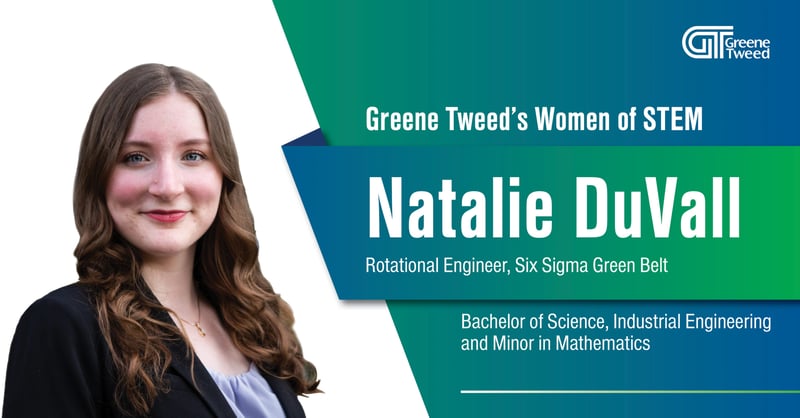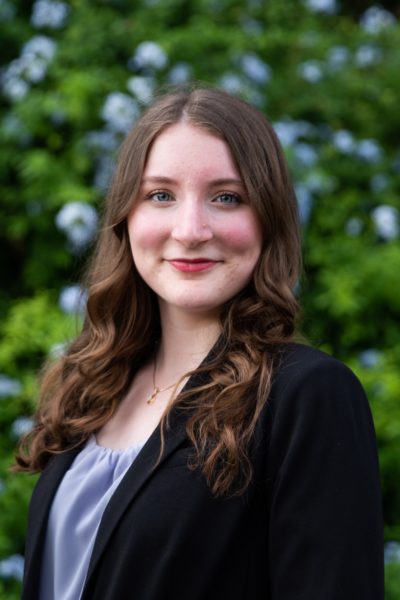
Women of STEM: Greene Tweed’s Natalie DuVall
Newly minted engineer urges others not to let anyone affect their aspirations
Natalie DuVall may be fairly new to the engineering profession, but her passion for solving problems and understanding the technical aspects of processes is already apparent in everything she does. That includes cycling through four major departments in Greene Tweed’s Selma plant near San Antonio, Texas, with an eye to finding her true engineering calling.
Already armed with a Six Sigma Green Belt, DuVall is extremely happy to have the opportunity to apply what she learned in college to solve real-world problems. “I love to learn and challenge myself,” she said. “The work I’ve been doing has allowed me to see firsthand the value of continuous improvement activities to eliminate waste and reduce variation.”
Rotating for success
DuVall graduated summa cum laude from the Honor’s College at Texas Tech University just a year ago in May 2018, with a B.S. in industrial engineering and a minor in mathematics. She is currently a rotational engineer at Greene Tweed, a 2-year program during which she serves 6-month stints in the plant’s manufacturing, quality, applications, and process engineering departments. Greene Tweed is a leading manufacturer of high-performance elastomers, advanced-engineered thermoplastics, high-performance thermoplastic composites, and integrated material solutions, with facilities across North America, Europe and Asia.

Natalie DuVall
“The rotational program is great, because it allows me to gain experience in a diverse set of engineering functions, while giving me the opportunity to make connections and work with cross-functional teams,” said DuVall. She added, “Once I get to test drive all the areas and complete the program, I will be able to identify what my true passion is and pursue it in a permanent role.”
During her first rotation in the manufacturing department, DuVall piloted factory modeling using Simio simulation software for the entire company. Her work led to an invitation to join Greene Tweed’s manufacturing technology development (MTD) group as part of the company’s “Right FITT™” initiative. The Right FITT™, or Factory Innovation and Technology Transformation, is focused on updating factory equipment and production processes in all of Greene Tweed’s manufacturing locations with the most advanced and current technology. This enhances the company’s visionary approach to Industry 4.0 standards and future growth.
She is extremely proud of the results, saying “I was able to replicate a portion of our Chemraz® value stream in the Simio simulation software to provide greater visibility of our processes and illuminate areas of opportunity through more granular resource analysis and scenario planning.” She also noted that using the software, along with current controls and other automation, will help the team make more informed decisions regarding overall production.
While using the software, she identified a bottleneck and discovered that investing in a few more tools could significantly improve resource utilization and throughput while netting savings of just over $600,000 a year. When she shared these results with the team, DuVall got buy-in from all the sites to launch the software company wide.
She kept up the pace after rotating over to the quality department, where she led several root-cause corrective action analyses, using the eight disciplines (8D) problem-solving approach to identify, correct, and prevent recurring problems.
In addition, during her quality department rotation, she has been working to develop inspection criteria, support metrology development, and ensure operational readiness for Greene Tweed’s new ONX™ 600 product line. ONX™ 600 is a fluoropolymer-based, carbon-fiber-reinforced composite. This high-strength, high-purity material withstands strong acid chemistries at high temperatures in wafer cleaning applications in the semiconductor industry.
STEM is in the family DNA
DuVall credits early exposure to science, technology, engineering and mathematics (STEM) with her ability to hit the (engineering) ground running. She grew up in a STEM family, with her mother, father, grandfather, uncle, aunt, and sister all in technical fields. She remembers growing up hearing stories of how her mother and uncle built and raced go-carts in their college Grand Prix competition. When she was old enough, she helped her grandfather build carts and race them for family fun during the summer. “But most importantly, I am so happy that I was able to grow up seeing my mother’s dedication to her work and drive to succeed because I would not be where I am today without her as my role model,” she said.
DuVall strongly believes that there should be more women in engineering. In her view, diversity provides alternative perspectives to problem solving, which ultimately leads teams to make better decisions and bring maximum value to customers.
To increase the numbers, she says it is important for young girls to have strong female role models and be exposed to STEM fields growing up so that they are aware of all the opportunities available to them. For instance, DuVall attended a summer camp in high school that helped her decide her specialty before entering college.
She is also a member of the Society of Women Engineers (SWE). In college, she participated in the organization’s “Catch the Engineering Bug,” during which young girls from nearby schools participated in student-led activities and games within each engineering discipline. The goal was to increase their exposure, show them how much fun engineering can be, and hopefully inspire them to pursue STEM fields.
DuVall concluded, “My advice to young girls is to not let others’ ideas about what women should do affect your aspirations. Surround yourself with people who support you, because with hard work anything is possible.”









